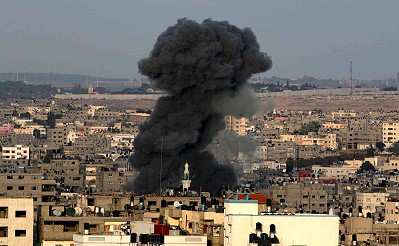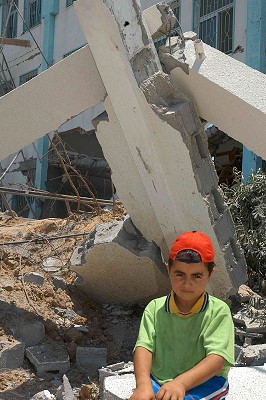The lying Nutanyahoo attempts to avoid the lobster quadrille with the Quartet, preferring to commence a secret hasbara tango with an illegitimate Abbas, who is making offers without consultation again. Anyone who’s read the Liekud Party platform, which remains unchanged, or Nutanyahoo’s Bar Ilan speech of June 09, knows how disingenuous Nutanyahoo really is. He can’t go against his own party platform which says, amongst other chauvinist, colonialist drivel that flies in the face of international law:
The Jewish communities in Judea, Samaria and Gaza are the realization of Zionist values. Settlement of the land is a clear expression of the unassailable right of the Jewish people to the Land of Israel and constitutes an important asset in the defense of the vital interests of the State of Israel. The Likud will continue to strengthen and develop these communities and will prevent their uprooting.
…
The Government of Israel flatly rejects the establishment of a Palestinian Arab state west of the Jordan river.The Palestinians can run their lives freely in the framework of self-rule, but not as an independent and sovereign state. Thus, for example, in matters of foreign affairs, security, immigration and ecology, their activity shall be limited in accordance with imperatives of Israel’s existence, security and national needs.
Palestine / Gaza Links
Viva Palestina is finalising plans for the Kick Off for Palestine campaign to construct and maintain links with sporting venues in the besieged Gaza Strip.
Ali Abunimah makes a terrific post examining the differentiation between criticism of jewishness and zionism in matters of dual loyalty:
I agree fully with Jones’ reading of Flynn’s reported comments. If accurate it is indeed outrageous to suggest that a British person cannot be loyal to the UK just because he or she is also Jewish. And it’s even more outrageous to suggest that a Jewish person has no “roots” in the UK, just as it would be to suggest the same of a British Muslim or any other person.
But what Jones – and perhaps other critics of Flynn’s comments – have missed, is that the claims Flynn reportedly made have always been at the very heart of Zionism.
Joseph Massad has noted this in his crucial book The Persistence of the Palestinian Question as has international law expert Victor Kattan.
The basic idea is simple enough: Zionists, just like anti-Semites, believed that Jews were inherently alien and rootless in Europe and needed to be expelled physically. The “father” of Zionism, Theodor Herzl in his seminal tract, Der Judenstaat, wrote this nauseatingly anti-Semitic passage:
The Jewish question exists wherever Jews live in perceptible numbers. Where it does not exist, it is carried by Jews in the course of their migrations. We naturally move to those places where we are not persecuted, and there our presence produces persecution. This is the case in every country, and will remain so, even in those highly civilized—for instance, France—until the Jewish question finds a solution on a political basis. The unfortunate Jews are now carrying the seeds of Anti-Semitism into England; they have already introduced it into America.
Of course the “political solution” of which Herzl spoke was – Zionism – the removal of Jews from Europe and America so that they could not carry with them the “seeds” of their own persecution.Greatest British Zionist hero a vile anti-Semite
It is no coincidence then that the greatest British hero of Zionists to this day is Lord Arthur Balfour whose eponymous Balfour Declaration promised the Zionist movement that to which it had no right: the land of Palestine.
As Kattan points out in his book From Coexistence to Conquest: International Law and the Origins of the Arab-Israeli Conflict 1891-1949, Balfour’s anti-Semitism was well documented and expressed in his writings. From Kattan:
Zionism actually provided Balfour and those who thought like him with the perfect pretext to reduce Jewish immigration into Britain whilst portraying themselves, falsely, as ‘humanitarians’ concerned about their welfare. This is what Balfour wrote in the conclusion to his introduction to Nahum Sokolow’s epic book, the History of Zionism, 1600–1918 (1919):
If [Zionism] succeeds, it will do a great spiritual and material work for the Jews, but not for them alone. For as I read its meaning it is, among other things, a serious endeavour to mitigate the age-long miseries created for western civilisation by the presence in its midst of **a Body which it too long regarded as alien and even hostile, but which it was equally unable to expel or absorb. Surely, for this if for no other reason, it should receive our support.
That Balfour had the gall to write this in a book on Zionism was foreboding. One can only imagine what he wrote about the Jews in private or in correspondence that was destroyed or lost.
Indeed. And, as Kattan documents, such sentiments were shared by German anti-Semites who in the same period became enthusiastic supporters of Zionism.
U.S. military chief: Unclear if Israel would alert U.S. ahead of attack on Iran – protocols stuffed?
He said the United States was convinced that sanctions and diplomatic pressure was the right path to take on Iran, along with “the stated intent not to take any options off the table” – language that leaves open the possibility of future military action.
“I’m not sure the Israelis share our assessment of that.
And because they don’t and because to them this is an existential threat, I think probably that it’s fair to say that our expectations are different right now,” Dempsey said in an interview as he flew to Washington from London.
Asked whether he was talking about the differences between Israeli and U.S. expectations over sanctions, or differences in perspective about the future course of events, Dempsey said:
“All of the above.” He did not elaborate.
He also did not disclose whether he believed Israel was prepared to strike Iran.
Fayyad to Haaretz: I will not lead a Palestinian unity government
Survey released last week shows 57 percent Palestinians want Prime Minister Salam Fayyad to serve as head of the unity government.








